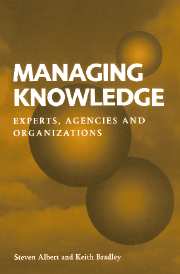Book contents
- Frontmatter
- Contents
- List of figures
- List of tables
- Introduction: the supply-side in context
- Part 1 Expert employees and their new organization
- 1 Trends in the labour market
- 2 Adaptations in the labour market and the expert employee
- 3 From the firm to the agency
- 4 Expert agency employment as a facilitator of intellectual capital
- 5 The temporal advantages of agency work for the expert employee
- 6 Taking stock
- Part 2 The labour market and the expert employee
- Appendix A Formal exposition of Winston model
- Appendix B Agency employment and search costs
- Notes
- References
- Index
4 - Expert agency employment as a facilitator of intellectual capital
Published online by Cambridge University Press: 23 November 2009
- Frontmatter
- Contents
- List of figures
- List of tables
- Introduction: the supply-side in context
- Part 1 Expert employees and their new organization
- 1 Trends in the labour market
- 2 Adaptations in the labour market and the expert employee
- 3 From the firm to the agency
- 4 Expert agency employment as a facilitator of intellectual capital
- 5 The temporal advantages of agency work for the expert employee
- 6 Taking stock
- Part 2 The labour market and the expert employee
- Appendix A Formal exposition of Winston model
- Appendix B Agency employment and search costs
- Notes
- References
- Index
Summary
In closing I should acknowledge that there are two kinds of knowing: knowing how, as in swimming and bicycling, and knowing that.
W. V. Quine, QuidditiesAgency employment, often thought to be atypical, can play an important role in the development of competitiveness for individuals, businesses and, indeed, nations. This is because of the strong links between experts, the transfer of knowledge and intellectual capital. During the twentieth century, capitalism built a strong foundation on physical and financial assets. Today, however, companies are in a process of retooling and developing new strategies which will assist them to be competitive at a time of unprecedented change in product and labour markets and technology. Recently micro-electronics created an Age of Information and, over the past ten years, there has been momentous advances in the science of bio-chemistry and genetics. Both bring the advent of another redefinition of our boundaries concerning knowledge.
In this chapter, we view knowledge as one of the integral parts to production and explore its consequences on the business and work environment with regard to the expert employee. We believe that in this evolving knowledge environment, individuals and companies will have one source of competitive advantage: intellectual capital. This represents an individual's accumulated knowledge and know-how, coupled with the ability to decant this into a system, predicated upon information technology, which will facilitate its speedy dissemination while protecting its quality. The term ‘intellectual capital’, we believe, has its roots in a history of literature which views employees as assets in which to invest. Because of this, we have written this chapter in two parts.
- Type
- Chapter
- Information
- Managing KnowledgeExperts, Agencies and Organisations, pp. 64 - 81Publisher: Cambridge University PressPrint publication year: 1997



